Seniors
Senior Boxer Dog Care
Overview
With canines in general, there is not one specific age that a dog becomes a senior; it varies from breed to breed and dog to dog. Typically it is earlier for larger breeds and later for smaller breeds.
The Boxer dog is considered to be a senior some time between the age of 7 and 8 years old. This is mainly due to where he or she is in relation to the typical life span of this breed, which is 9 to 12 years. Yet, many Boxer do live beyond that, reaching well into their teens.
The declaration of a Boxer dog transitioning into a senior is usually done by the Boxer's veterinarian. Even if the vet has not made this official, the latest that one could hold off from dubbing their Boxer dog a senior would be 9 years old.
Many owners resist using this term, as they never want to think of their dog as being 'old'. However, changes in care need to happen at this time and owners need to be very aware of the increased risk of certain health issues.
For these reasons, it's best to accept that your Boxer dog is indeed entering his senior years. Working together with your vet, you can then make a senior Boxer's life much more comfortable and even extend his life span.
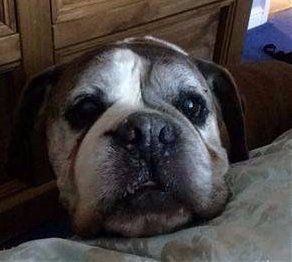

Charlie, 12 and 1/2 years old
Seen here with soccer player Paul Mannion from Dublin, and the All Ireland Trophy
Photo courtesy of Graham Lloyd, from Goatstown, Dublin
It's Never Too Early or Too Late to Start Thinking About Senior Boxer Care
Everything that you do to care for your Boxer over the course of his life, culminates to his status as a senior. From the food that you offer to how much you exercise him... from how often you brush his teeth to whether or not you schedule and keep wellness checks with the vet... How you care for your Boxer during the puppy, adolescent and adult years will matter once he is older.
This said, it's also never to late to start. If there are certain care elements that have been lacking, do not think, "Well, I never did this before, so it's too late to help now'. Even little changes can add up and benefit a senior dog.
Geriatric Wellness Checks
While much of the care needs of a senior Boxer dog will be done at home by you, a huge element of this is that veterinarian wellness checks will increase from 1 time per year to twice per year.
Cancers, heart disease, diabetes and neurological issues are all concerns for aging Boxer dogs. It is vital to have your Boxer screened for these issues and have a full examination biannually. Early diagnosis saves and extends the lives of dogs. And if there is an issue, prognosis is better when it is caught early, with appropriate treatment being given.
The vet will also discuss your Boxer's diet and work with you to make any needed adjustments.
Teeth will be checked for decay or infection. A stool sample will be examined for parasites. A urinalysis and CBC will be done to screen for conditions. Hearing and eye sight will be assessed. All of these things are vital in keeping a Boxer dog going strong. And when owners ask what they can do to properly care for their senior Boxer, seeing the vet for wellness checks is nonnegotiable.
The Top 4 Ways to Care for a Boxer Dog About to Enter into the Senior Years (6 to 7 Years Old)
1) Proper Exercise
- You've probably seen that commercial that tells us, 'A body in motion stays in motion... ' and it's really true. This breed tends to have trouble with hip and knee joints as he ages. And once a Boxer hits the 8 or 9 year mark and has transitioned into a senior, there is a gradual yet steady loss of muscle mass.
It's really hard for a senior Boxer to maintain his strength, endurance and muscle ratio. However, making sure that your adult is
receiving exercise twice per day and continuing that for your senior can go a long way in keeping him healthy.
Unless a Boxer has a medial condition that prevents him from doing so, duration
of exercise should remain consistent, with the pace
decreased as the Boxer ages. Stay with a minimum of two walks per day of 20 to 30 minutes, going at a pace that is comfortable for your particular dog.
Encourage him to stay active by initiating an outdoor game of fetch and bring him out to parks. And one of the best tips for keeping muscles strong is to walk your Boxer up moderate hills; this is great for building or maintaining strength in the knees (and if often part of a treatment plan when a dog is at the end stage of recovering from patella luxation).
You'll want to take care, of course, to not push your Boxer too hard, bring water to take a rest at the halfway point, avoid walking when it's too hot in the summer
(take him out early morning and then later in the evening) and do apply a quality paw wax to help with traction, prevent burns to the paws on hot days and repel tiny pebbles that can get stuck between the pads.
2) A Great Diet - Meals, Snacks, Water
Hopefully, an owner pays close attention to these needs all throughout their Boxer's life, but again, it's never to late to start. Older, senior Boxers need a bit more protein and since they tend to drink less, some extra water via snacks can do wonders. In addition, wholesome foods such as fruits can offer a boost of vitamins and antioxidants.
Here are some tips:
- Reassess your Boxer's main meals and snacks.The brand you are feeding him should have a 4 or 5 star rating.
- Add some tuna (white meat, water packed) or an egg (boiled or scrambled) to his meal; these are both low calorie, high protein foods
- Senior Boxers that are into their teens, can have trouble with dry kibble; drizzle low-sodium chicken or beef broth on the food and warm this in the microwave
- Offer water-packed fruits such as blueberries and raspberries; both of these also have high level of disease fighting antioxidants
- Use a filter on your kitchen tap; the level of chemicals in tap water that are proven to cause disease is staggering. Never you or your pets should drink unfiltered water.
- For at least one of your senior Boxer's daily snacks, give a dental treat to help remove plaque and keep jaws strong.
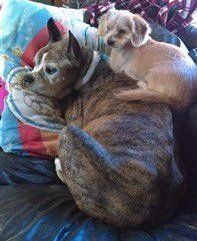
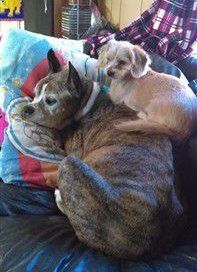
Chato, at 14 years old
Photo courtesy of Christina Conklin
3) Dental Care
Tooth decay leads to infection and tooth loss. With infection, not only can this be terribly painful, it can also spread up to the sinuses or lead to sepsis, an all-over body infection that is severely life-threatening. And once a Boxer loses more than a couple of teeth, this can really take a toll on his ability to comfortably eat. Using a quality paste and toothbrush, daily dental cleanings
should be done at home. Those twice-per-year vet visits will help identify any issues so that they can be treated before it becomes severe.
While owners tend to avoid bringing their Boxers for 'full dentals' with the vet in which the dog is put under anesthesia in order for the teeth to be cleaned, scraped and x-rayed, having this done at least every 2 years is an important part dental hygiene and prevention of gingivitis, decay and infection.
4) Mental Stimulation.
Sure, dogs love having a schedule and are comfortable with the familiar, but at the same time it's healthy for an adult Boxer to have mental stimulation and social interaction; this can help prevent cognitive issues that are often seen with senior dogs.
Bring your Boxer to new places (the beach, for a hike, to an outdoor market), play games such as puzzle games (you can do this with upside-down cups and hidden treats or buy canine puzzle games that have levers, knobs and hidden chambers for a fun challenge) and nothing beats a rousing game of hide and seek. Even just altering the walking route to allow for new scents, sights and sounds can be helpful.
Changes to Expect with the Senior Boxer Dog (8, 9 Years and Older)
Ask an owner of one of the
oldest living Boxer dogs at what age they noticed their Boxer slowing down, and it's hard to pinpoint an exact time. It's tricky like that; your Boxer was a hyper, active adult and now he's clearly showing his age... but when did that happen?
It creeps up slowly and in many cases, an issue was present but not noticed until it became impossible to ignore.
For the comfort and happiness of a senior Boxer, it's good to know what sort of changes to expect and how to deal with them:
1. Hearing loss.
This is very common for older dogs. It often begins around the age of 9 year; after this age many senior Boxer have moderate to severe hearing loss. In most cases, this is a natural part of aging and there is no cure. Signs of this include not responding to his name being called, not listening to commands or seeming to be startled when someone pets him.
What to do: When giving commands, start to work in hand signals. When entering a room, flip the light switch on and off to alert him. Ask anyone who approaches your senior Boxer to do so after the light signal and from the side so that he can see them in advance. Reward good behavior with treats and pats, since the Boxer may not hear words of praise.
2. Decreased vision.
While this is common for senior dogs, it is important to keep with those wellness checks to rule out vision issues that can be corrected. The eyes of an older Boxer may have a bluish transparent "haze" in the pupil area. In some cases, it will be an issue of lenticular sclerosis which does not affect vision.
In other cases, it may be due to cataracts. Some dogs can live with mild cataracts (under 30 % opacity).
Those that are due to diabetes or that are over 60% opacity should be treated with surgery.
It will be important to have any eye clouding to be checked by the veterinarian since cataracts are a progressive disorder that may lead to blindness.
With or without haze in the eyes, senior dogs often cannot see as far, as well in the dark and/or even close up.
What to do: At this stage, it is important to refrain from making changes to the layout of the house. Food, water, toys, sleeping area, furniture, etc. should not be moved. Even dogs with very limited vision can do great when they know where everything is.
For dogs with moderate to severe decreased vision, you will need to block off access to any areas that may be dangerous when at all possible and place gates to stairways. It can also help to scent-mark 'good' and 'bad' areas - This is done by placing vanilla scented oil to 'good' areas such as the food & water bowls, bed, toy area, etc. And bitter apple scent to 'bad' areas which would be places and objects you do not want your Boxer to go near but you are unable to block access to them.
3. Changes in sleeping patterns. Dogs sleep the most when they are very young and again when they are old. Nighttime sleep may be restless and fitful and senior Boxers need to take more naps during the day.
What to do:
It's really important for older Boxers to have a quality orthopedic canine bed. These will help cushion aching joints and provide proper support for an aging body. You may also want to experiment with various sized pillows to see what aids your Boxer in finding optimal comfort. Side note, a pillow can also help with snoring.
Reassess the location of your Boxer's resting and sleeping areas. What a younger dog tolerated may be too much for a senior; you'll want him to be able to relax in a spot where he does not feel isolated but is well away from foot traffic and other areas of distractions. In addition, checks for drafts that can be coming in from the outside but also if the Boxer is too lose to AC vents in the summer.
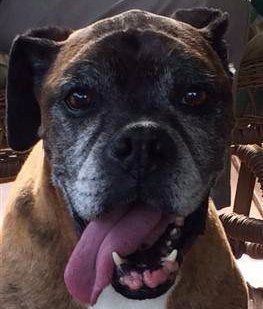

Otto, at 13 years old
Photo courtesy of Judith B. Slagle-
Johnson City, TN
4. Changes in appetite.
It's often a combination of things that can cause a senior Boxer dog to eat less. For sure, dental issues will affect his ability to eat, and this is one reason why we stress the importance of at-home dental care paired with professional cleanings and checkups.
It's not uncommon for an older Boxer to have a loose tooth; with very old Boxers, some may be only held in by surrounding gum tissue.
In addition, not being as mobile and performing less activity can result in self-regulating, where the Boxer simply eats less because his body needs less.
What to do:
You'll want to report any changes in weight
to the vet. The loss of a pound or two is common, but more than that may point to an underlying health issue. Many older dogs need to transition to a wet food or can stay with a dry kibble if warmed low-salt broth or gravy is blended in to soften the pieces. Smaller yet more frequent meals can also help.
While you want to stay away from greasy or heavy foods that can upset the stomach, you can feel free to spoil your senior Boxer with wholesome foods such as chicken, plain rice, mackerel (a great source of omega's), tuna and fruits (banana, a bit of pumpkin - this can help keep the digestive tract healthy, strawberries, blueberries, raspberries and even some watermelon),
5. Dry skin, coat, nose, paws.
Just one of these issues is enough to cause discomfort and if a Boxer has dryness in all of these areas, it can be a lot for a dog to deal with.
Dry nails can easily break. Dry skin can cause moderate to severe itching. And a
dry nose and/or paws can lead to peeling, cracking and even open-sore infection.
What to do: In between baths, use a quality leave-in spray on the coat. This will add protect the fur from static, contact friction and elements such as the sun and arid air in the winter.
Also, brush the coat on a regular basis, at least every other day is recommend and once a day is optimal. When you brush, this distributes natural body oils and most Boxers love the massage-like feel of this as well.
When you groom the coat, use this as an opportunity to run your hands over your dog's entire body, feeling for any sort of lump or bump; if you do find something, report this to the vet immediately.
A quality nose balm should be applied regularly to keep the nose leather moist and healthy.
A quality paw wax should be applied every 4 days or so; this is great for helping a senior Boxer with better traction and will aid in preventing and healing dry paw pads.
Stay on schedule with nail trimmings, since brittle nails are common and even just a bit of extra length can lead to breakage.
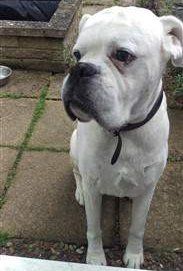

Ollie, at 12 years and 3 months old
Photo courtesy of Lorraine Johns
6. A slowing down.
Just about all senior Boxers have some arthritis
and this can cause stiffness and discomfort that interferes with a dog's mobility. It may be hard to rise up from a down position or climb up onto furniture. In addition, an older dog's aging body will not be able to perform as it once did, walking will be slower and endurance will decrease.
What to do: It's important to have other health issues
ruled out; neurological disease, hip dysplasia, even a torn ligament may be the cause of mobility issues. For arthritis, prescribed medication and supplements for joint health can help with this. You may also find that your Boxer appreciates a warm heating pad on areas of his body that tend to get sore and stiff.
You can help care for a senior Boxer with decreased mobility by placing ramps next to furniture that they love getting up onto. For those that really have trouble, even trying to give a bath can be difficult and a dry shampoo can be great for this.
You should lower your activity expectations for your older Boxer, but continue with walks as long as you can, even if this is just a very slow stroll down the driveway and back again. And be sure that your Boxer has a high-quality canine orthopedic bed.
7. Cognitive issues.
Known as canine cognitive dysfunction (CCD), this is similar to dementia seen in humans. Changes may be seen in awareness, learning, memory and decreased responsiveness to stimuli.
A dog may show some anxiety that manifests as pacing and trouble sleeping. Other symptoms include staring at the walls, becoming lost in the house, intolerance for new situations (visitors, going to new places, etc.) and even forgetting housebreaking rules.
What to do: Both hearing and vision loss can mimic some of the signs of this, so you'll definitely want to have your senior Boxer checked for those issues. If your dog is diagnosed with CCD, do know that this in itself is not fatal and many older dogs live just fine with some extra care changes in the home.
Sticking to a schedule for all aspects throughout the day is very helpful; walks, meals, grooming, sleep, trips outside for bathroom needs,dimming lights to signal sleep time, etc. As with vision and hearing loss, you'll want to start using lights (on or off) to signal changes such as a person entering the room or when it's time to rest.
For problems with anxiety, techniques such as playing soothing music, experimenting with views vs non-views (via curtains opened or closed) and limiting triggers (visitors, etc.) can help. Remove any fluorescent lighting, as this can cause a high-pitched hum (that we can't hear, but dogs can) that some find very irritating.
Supplements such as Ginkgo Biloba and fish oil seem to help some dogs with CCD. If anxiety becomes severe, speak to your vet about a possible anti-anxiety medication. As of now, there is only 1 approved medication for CCD, Anipryl (selegiline), that does not cure it, but may slow down its advancement. You may want to speak to your vet about this.
Other Changes- Graying Fur - Lots of owners want to know it it's normal for a Boxer dog's fur to turn gray as he ages, and yes it's very common! It often happens just around the muzzle, but for some teen-aged Boxers, the coat can eventually turn gray all over the body.
A Final Word
It is a lifetime of good care that leads to a comfortable old age for this breed. Every day is an opportunity to take steps that will increase your Boxer dog's chances to live a long, healthy and happy life. While no one wants to think of their dog as being old, accepting this and making changes to his care is a vital. Changes you make at home and working together with the vet is the best way to ensure that a senior is getting the care that he needs.
You May Also Like:
Boxer Dog Eye Goop - Also referred to as eye boogers, this sort of thick discharge is common, but can be a sign of an eye issue. Read what's normal and what's not and how to keep the eye area nice and clean.
Boxer Dog Has a Cracked Nose- Drying, peeling and cracking on the nose is more common in the winter when the air is super arid, but can be an issue at anytime. This can quickly spiral out-of-control, so you'll want to treat this before it progresses.
My Boxer Dog is Too Skinny
- It's not uncommon for a Boxer to struggle a bit to catch up when he's young; growth spurts can be intense and this leaves a window of time in which there are huge increases in height, but not in weight.
AllBoxerInfo.com All content is protected by US and International copyright laws. All rights reserved.
We are a participant in the Amazon Services LLC
Associates Program, an affiliate advertising program designed to provide a means for us to earn fees by linking to Amazon.com and affiliated sites.
